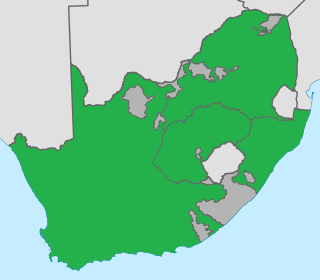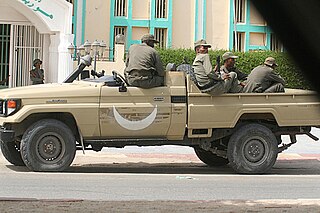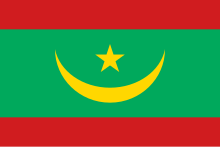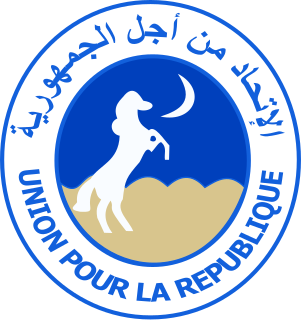
The first fully democratic Presidential election since 1960 occurred on 11 March 2007. The election was the final transfer from military to civilian rule following the military coup in 2005. This was the first time the president was selected by ballot in the country's history. The election was won by Sidi Ould Cheikh Abdallahi, who was ousted by a military coup in 2008 and replaced by general Mohamed Ould Abdel Aziz.

Lieutenant Colonel (ret.) Mamadou Tandja is a Nigerien politician who was President of Niger from 1999 to 2010. He was President of the National Movement of the Development Society (MNSD) from 1991 to 1999 and unsuccessfully ran as the MNSD's presidential candidate in 1993 and 1996 before being elected to his first term in 1999. While serving as President of Niger, he was also Chairman of the Economic Community of West African States from 2005 to 2007.

Colonel Ely Ould Mohamed Vall was a Mauritanian political and military figure. Following a coup d'état in August 2005, he served as the transitional military leader of Mauritania until 19 April 2007, when he relinquished power to an elected government.

A referendum on a new constitution was held in South Africa on 2 November 1983 in which the white population was given the opportunity to approve or reject the Constitution of 1983. This constitution introduced the Tricameral Parliament, in which coloured and Indian South Africans would be represented in separate parliamentary chambers, while black South Africans would remain unrepresented. The referendum passed with 66.3% of voters voting "Yes"; consequently the new constitution came into force on 3 September 1984.

A Mauritanian presidential election occurred on 11 March 2007. Since no candidate received a majority of the votes, a second round was held on 25 March between the top two candidates, Sidi Ould Cheikh Abdallahi and Ahmed Ould Daddah. Abdallahi won the second round with about 53% of the vote and took office in April.
Cheikh El Avia Ould Mohamed Khouna is a Mauritanian political figure. He was the 7th Prime Minister of Mauritania from January 2, 1996 to December 18, 1997, Minister of Foreign Affairs from July 12, 1998 to November 16, 1998, and Prime Minister again from November 16, 1998 to July 6, 2003 under President Maaouya Ould Sid'Ahmed Taya; later, he briefly served as Minister of Foreign Affairs again in 2008.

A constitutional referendum was held in Venezuela on 2 December 2007 to amend 69 articles of the 1999 Constitution. Reform was needed, according to Venezuelan President Hugo Chávez, to initiate the transformation into a socialist country; detractors said he was using the reforms to become a dictator.
The People's Progressive Alliance is a political party in Mauritania.

A coup d'état took place in Mauritania on August 6, 2008, when Mauritanian President Sidi Mohamed Ould Cheikh Abdallahi was ousted from power by a group of high-ranking generals he had dismissed from office earlier that day.

A presidential election was held in Mauritania on 18 July 2009. Mohamed Ould Abdel Aziz, who led the 2008 coup d'état, won a narrow first-round majority in the election, according to official results. A second round, if necessary, would have been held on 1 August 2009.

Ba Mamadou dit Mbaré was a Mauritanian politician who served as President of the Senate of Mauritania from 2006 until his death. As President of the Senate, he succeeded Mohamed Ould Abdel Aziz as Head of State on 15 April 2009, when Abdel Aziz resigned to take part in the June 2009 presidential election. Abdel Aziz was then elected President and in turn succeeded Mbaré on 5 August 2009.

A constitutional referendum was held in Niger on 4 August 2009. The referendum proposed the dissolution of the Fifth Republic and the creation of the Sixth Republic under a fully presidential system of government, offering a yes or no vote on the suspension of the constitution and granting President Mamadou Tandja a three-year interim government, during which the constitution of the Sixth Republic would be formulated. On 20 June, the Constitutional Court declared the plan illegal, but Tandja subsequently assumed emergency powers and dissolved the Court. The events surrounding this election led to a constitutional crisis.

A fifteen-part constitutional referendum was held in Colombia on 25 October 2003. Whilst all fifteen proposals were approved by voters, only one question had a sufficient numbers of votes to pass the 25% quorum requirement.

A constitutional referendum was held in the Republic of the Congo on 25 October 2015 regarding a proposal to change the constitution, primarily to modify the rules regarding presidential terms.
The following lists events in the year 2017 in Mauritania.

















